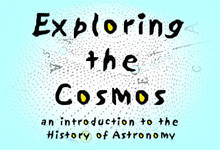

Department of History
University of California, Irvine
Instructor: Dr. Barbara J. Becker
![]()
Lecture 8. The Message from the Stars.
![]()
The Book of Nature vs. The Book of Scripture |
Seventeenth-century observers using new instruments like the telescope encountered never-before-seen phenomena. As surprising as all these phenomena were, some could easily be made to fit with prevailing notions about the world and how it is structured. This was true of Galileo's discovery that the Milky Way was not so much a filmy cloud as an aggregate of innumerable closely-spaced stars. But other phenomena -- mountains on the lunar surface or "stars" orbiting Jupiter, for example -- contradicted accepted authority, raised serious doubts about the adequacy of old explanations, and caused observers to think more critically about the evidence upon which existing knowledge was based. As an avid observer, prolific writer and skilled rhetorician, Galileo often found himself at the center of vigorous debates over what counts as scientific evidence, who has the authority to interpret it, and what does it tell us about the form and function of the natural world around us. |
|
The Grand Duchess Christina of Lorraine (1565-1637) was the granddaughter of Catherine de' Medici. When her husband, Ferdinand de' Medici died in 1609, their eldest son, Cosimo (1590-1621)--whom Galileo had tutored in mathematics just a few years before--became the new Grand Duke of Tuscany. In 1610, Galileo dedicated his new book, Sidereus Nuncius, to Cosimo II, and named the four newly discovered satellites of Jupiter the Medicean stars in honor of Cosimo and his three brothers. Unfortunately, Cosimo became ill and died in 1621. Cosimo's mother, Christina, and his widow, Maria Maddalena of Austria, served as regents for the new Grand Duke, young Ferdinand II (1610-1670).
|
Benedetto Castelli (1578-1643), a monk, was perhaps Galileo's favorite student. In December 1613, Castelli, the newly appointed chair of mathematics at the University of Pisa, was invited to breakfast with the Tuscan court. Here's how he described his experience in a letter (December 14, 1613) to Galileo:
|
|
Galileo composed a lengthy response (December 21, 1613) to Castelli. In it, he expressed his concern that theologians, ignorant of basic astronomical principles, risked compounding their errors through misinterpretation of Holy Scripture and misapplication of its authority to problems in natural philosophy:
|
| In 1615, Galileo wrote a lengthier and more detailed version of this letter which he addressed to the Grand Duchess Christina herself. His letter to Castelli, meanwhile, was privately circulated. But it eventually came to the attention of some of Galileo's enemies. In February 1615, a Dominican friar, Niccolò Lorini, sent a copy of Galileo's letter to Rome as evidence of his heresy, prompting the authorities of the Inquisition to call Galileo in for questioning and admonishment. |
Notable Events in Galileo's Life (cont'd) |
|
1616 |
Copernican theory condemned by Church
Galileo called to Rome and told to stop teaching Copernican system |
|
|
12. Then spake Joshua to the Lord in the day when the Lord delivered up to the Amorites before the children of Israel, and he said in the sight of Israel, Sun, stand thou still upon Gideon; and thou, Moon, in the valley of Ajalon. 13. And the sun stood still, and the moon stayed, until the people had avenged themselves upon their enemies. Is not this written in the book of Jasher? So the sun stood still in the midst of heaven, and hasted not to go down about a whole day. 14. And there was no day like that before it or after it, that the Lord hearkened unto the voice of a man: for the Lord fought for Israel. Ecclesiastes 1:5-9 5. The sun also riseth, and the sun goeth down; and hasteth to his place where he arose. 6. The wind goeth toward the south, and turneth about until the north; it whirleth about continually, and the wind returneth again according to his circuits. 7. All the rivers run into the sea; yet the sea is not full; unto the place from whence the rivers come, thither they return again... 9. The thing that hath been, it is that which shall be; and that which is done is that which shall be done: and there is no new thing under the sun. |
|
How Does the Sun "Move"? | |
Sunset on the Mediterranean at Riomaggiore, Italy on 25 March | |
Every day, according to Ptolemy, the Sun appears to be carried around the Earth
from East to West by the sphere of
the fixed stars (Circle of the Same).
The Sun itself does not "move". Like a stationary passenger whirling around on a merry-go-round or standing on a moving escalator, the Sun's apparent daily motion is due solely to the sphere of the fixed stars. The series of images below depict how the Sun appears to move as it sets: |
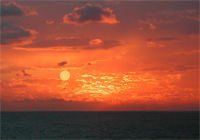 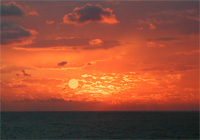 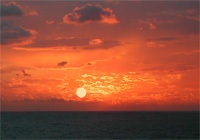 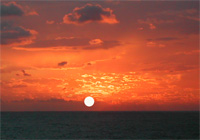 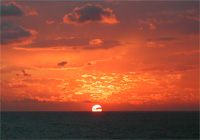 |
|
But, in Ptolemy's system the Sun displays another apparent motion. Every day, the Sun appears to shift its position slightly from West to East against the background stars. Over the course of a year, it appears to make one complete trip around the ecliptic (Circle of the Different).
The image below depicts the Sun as it appears to inch eastward along the ecliptic from 25 to 29 March.
| ||||||||
What Would Happen If the Sun "Stood Still"? |
||||||||
The sphere of the fixed stars (Circle of the Same) carries all celestial bodies along with it as it whirls around the Earth each day. The Sun's apparent motion around the ecliptic (Circle of the Different) is unique to the Sun. Galileo referred to this as its "proper motion". What would happen if that "proper motion" were stopped and the Sun "stood still"? |
||||||||
To see, let's compare the motions of two "suns" --
|
According to Galileo: [I]t is obvious that if the sun should cease its own proper motion, the day would become shorter, and not longer.... The way to lengthen the day would be to speed up the sun's proper motion; and to cause the sun to remain above the horizon for some time in one place ... it would be necessary to [accelerate] the customary speed of the sun about three hundred sixty times.... [I]f Joshua had intended his words to be taken in their pure and proper sense, he would have ordered the sun to accelerate its own motion.... But since his words were to be heard by people who very likely knew nothing of any celestial motions beyond the great general movement from east to west, he stooped to their capacity and spoke according to their understanding.... [Theologians] are forced to interpret the words in the midst of the heavens a little knottily, saying that this means no more than that the sun stood still while it was ... above our horizon. [U]nless I am mistaken we may avoid this and all other knots if, in agreement with the Copernican system, we place the sun in the "midst" -- that is, in the center -- of the celestial orbs of planetary rotations.... |
Notable Events in Galileo's Life (cont'd) |
|||
| 1623 | Galileo's friend, Cardinal Maffeo Barberini, became Pope Urban VIII
Galileo published The Assayer
|
||
| 1625 | Galileo began writing a defense of Copernican theory (future Dialogue...) | ||
| 1632 | published Dialogue Concerning the Two Chief World Systems; written in colloquial Italian, not Latin
Title page from Galileo's Dialogue Concerning the Two Chief World Systems. Notice that the title is in Italian, not Latin. The illustration shows three men engaged in a heated discussion on the site of the famed Venetian Arsenal. Copernicus (represented by the voice of Salviati in the dialogue) stands on the right holding a small model of his heliocentric universe in his hand. Ptolemy (Simplicio), in the center, listens attentively to a question from the curious and interested Venetian (Sagredo) on the left. Galileo ordered to stand trial |
||
| 1633 | placed under house arrest | ||
| 1635 | Dialogue... translated into Latin and English | ||
| 1636 | letter to Grand Duchess Christina published in Italian and Latin | ||
| 1638 | Discourses and Demonstrations Concerning Two New Sciences published at Leyden -- a handbook for those who wish to learn the language and methods of the new physics | ||
|